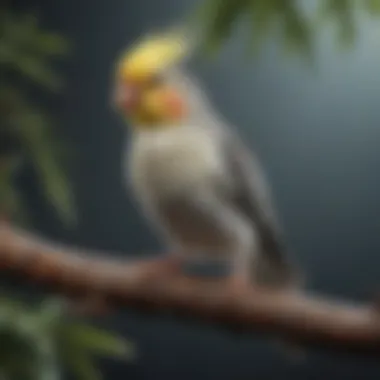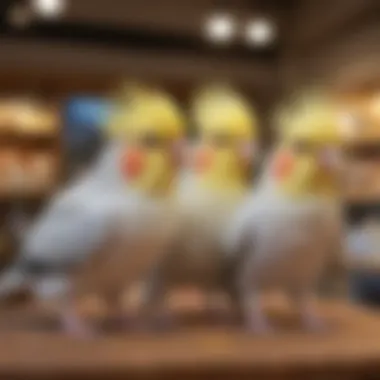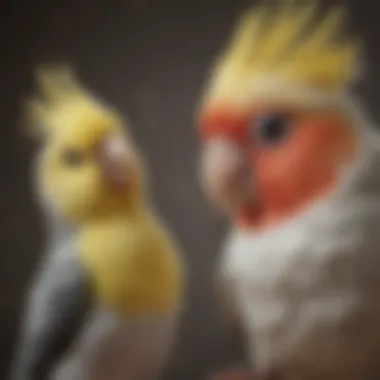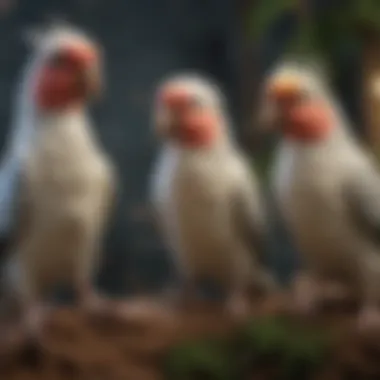Finding Cockatiels for Sale Near You: A Comprehensive Guide


Intro
Finding a cockatiel can be a significant and delightful experience. Many people desire these birds not only as pets but also as companions. Cockatiels are loved for their friendly nature and engaging personalities. However, before diving into ownership, it is important to understand several aspects related to these birds. This section introduces the reader to the pet, discusses its needs, and highlights the joy of owning one.
Understanding Your Pet
Pet Behavior Basics
Cockatiels are social creatures that thrive on interaction. They often exhibit playful and curious behavior. Understanding their social dynamics is key. They may enjoy being around people or other birds. It is essential to observe their mood and adjust your interactions accordingly.
Common Breed Characteristics
Cockatiels come in various colors and patterns, including grey, white, and yellow. A distinctive feature is their crest, which rises when they are excited or curious. Their whistling skills are notable and can become quite impressive with training. Recognizing these characteristics helps in understanding their behavior.
Species-Specific Needs
Cockatiels require a spacious cage to move around comfortably. They need toys for mental stimulation. Appropriate perches and grooming items are crucial as well. Their diet should consist of seeds, pellets, fruits, and vegetables. This diversity supports their health and well-being.
Pet Care and Maintenance
Feeding Guidelines
A balanced diet is vital for a cockatiel's health. Seeds alone are not enough. Providing a mixture of high-quality pellets, fresh fruits, and veggies is critical. You can incorporate items like carrots, broccoli, and bananas. Regularly changing their food prevents spoilage and ensures freshness.
Grooming Essentials
Grooming is not just for aesthetics but also for health. Regular feather inspections encourage bird hygiene. Trimming nails occasionally is necessary as well. Bathing should be encouraged, but do not use any soap products; fresh water suffices.
Hygiene Practices
Maintaining a clean habitat is paramount. Daily cleaning of food and water containers is essential. Weekly, the cage should be fully cleaned. Changing bedding helps reduce bacteria and keeps the environment healthy.
Training and Development
Basic Commands and Skills
Training cockatiels can be rewarding. Start with basic commands such as
Preface to Cockatiels
The Cockatiel is a popular choice for bird lovers around the world. Understanding these creatures is crucial for anyone considering bringing one into their home. Knowledge of cockatiels leads to better care and enhances the owner-bird bond. This section offers insights into their history, physical attributes, and temperament, helping potential owners make educated decisions.
History and Origin
Cockatiels originate from Australia. They were first discovered in the early 19th century by European explorers. This species quickly gained popularity in aviculture due to their beauty and companionship qualities. These birds live in a variety of habitats in Australia, including woodlands, scrublands, and grasslands. Their adaptability to different environments contributes to their resilience as pets. In captivity, they have been bred into various color mutations, such as lutino and pied. This variety makes them appealing to diverse audiences.
Physical Characteristics
Cockatiels are medium-sized birds, typically measuring twelve to fourteen inches in length. They have a distinctive crest on their heads and bright yellow or grey plumage, depending on their mutation. The males often have brighter colors, especially during mating displays, which makes identification relatively simple. Cockatiels have long tail feathers, which they often use for balance while perched. Their beak is strong and curved, allowing them to crack seeds, their primary food source. Additionally, their eyes can vary in color from dark brown to bright orange, adding to their unique charm.
Behavioral Traits
Cockatiels are known for their friendly and social nature. They are highly intelligent birds, capable of learning simple tricks and mimicking sounds. Interaction with their owners is essential for their happiness. These birds often bond with their humans, displaying affection through gentle preening or cuddling. Cockatiels can demonstrate a range of emotions, from curiosity to playful antics. However, potential owners must note that neglecting socialization may lead to behavioral issues. Understanding their needs is vital for ensuring a happy and fulfilling relationship.
Cockatiels require both mental and physical stimulation to thrive. Engaging them through play and interaction helps maintain their health and happiness.
Assessing the Commitment to Ownership
Understanding the commitment required for cockatiel ownership is essential for anyone considering adding one of these birds to their home. They are not just pets; they become part of your family. Thus, recognizing the needs of these birds and how they fit into your life is paramount. Adopting a cockatiel comes with responsibilities that extend beyond simply providing food and water. It involves time, financial resources, and making adjustments to your living environment.
Time and Interaction Requirements


Cockatiels are social creatures. They thrive on interaction and stimulation. Each day, they need time spent with their owner to develop trust and bonding. Ideally, you should dedicate at least an hour daily for handling, play, and interaction. This time helps your cockatiel to not only feel secure but it also encourages them to display their more engaging behavior.
Feeding routines also require attention. Fresh food should be provided daily, and interactions during feeding times can strengthen your relationship. Without proper time and social interaction, a cockatiel may become stressed, leading to behavioral problems.
Financial Considerations
When thinking about owning a cockatiel, a financial analysis is critical. The initial cost of purchasing a bird may seem modest, but ongoing expenses can add up quickly. You should account for the costs of a suitable cage, accessories, food, and regular veterinary care. Quality pellets and fresh fruits or vegetables form the foundation of their diet. It's also important to consider unexpected veterinary visits if health issues arise.
On average, you may spend around $30 to $50 monthly for food and general care, alongside initial investments ranging from $100 to $300 for a good cage and setup. Developing a budget is prudent to ensure that you are financially equipped to care for a cockatiel over its lifespan.
Space and Environment Adjustments
Cockatiels require a safe and engaging environment. A spacious cage with adequate room for movement is crucial. It should allow for enough horizontal space for flying. Besides the cage, play areas, such as bird stands or free flight time in a safe, bird-proofed room, should be planned.
The environment should also be enriched with toys and safe perches to keep the bird stimulated. Avoid areas with drafts, heat sources, or potential hazards, as these can stress the birds and affect their health. Think about how the introduction of a cockatiel might change your home’s layout and atmosphere.
Where to Find Cockatiels for Sale
Finding a cockatiel for sale is one of the most crucial steps for potential pet owners. This process involves various options from breeders to online resources. Each option has its unique merits and considerations. Understanding where to find cockatiels effectively helps ensure a happier experience for both the owner and the bird. Concentrating on reputable sources increases the likelihood of a healthy bird and a positive bonding experience.
Local Breeders
Evaluating Breeder Credentials
When looking for a cockatiel, it is vital to evaluate breeder credentials. A reputable breeder has a profound understanding of the breed and proper breeding practices. Breeders who focus on the health and temperament of their birds are generally more trustworthy. They often provide necessary documentation regarding genetic backgrounds and health history. This aspect of evaluating credentials develops buyer confidence and enhances the overall topic of finding a quality cockatiel. The unique feature of checking credentials is that it can help avoid health issues down the line, ensuring a long and happy life for the pet.
Questions to Ask a Breeder
Asking the right questions when engaging with a breeder is essential. Key inquiries should center around the bird's genetics, dietary needs, and any history of health issues. These questions are beneficial because they help potential buyers assess the situation comprehensively. Additionally, understanding the breeding conditions can give insight into how the bird was raised. This aspect is especially crucial for establishing trust between the buyer and seller, preventing further complications after the purchase.
Pet Stores
Reputable Stores vs.
Non-Reputable Stores
The distinction between reputable and non-reputable stores plays a significant role in finding a healthy cockatiel. Reputable stores prioritize animal welfare, selling birds that come from ethical sources. Non-reputable stores might not disclose critical information about the bird's health or its origin. This characteristic is vital to the overall goal of responsible pet ownership. Buying from reputable stores decreases risks related to ill health and behavioral issues of birds.
Considerations for Adoption from Stores
Adoption from pet stores can be a viable option, provided that certain considerations are respected. Be aware of the store’s policies regarding animal care and health guarantees. A well-organized store offers transparency about their birds’ health and backgrounds. The advantage of adopting from stores is accessibility, but it carries the risk of supporting inhumane breeding if not careful. Therefore, potential bird owners should do thorough research before making a decision.
Online Resources
Websites and Online Marketplaces
Online resources like specific websites and marketplaces provide a platform for finding cockatiels easily. This method increases options by connecting potential buyers with various sellers. The main advantage of online resources is convenience; however, they require some caution. Always verify sellers' credibility through reviews or recommendations before making a purchase. This aspect enhances the safety of transactions, increasing the likelihood of finding a healthy cockatiel.
Social Media Groups and Forums
Social media groups and forums serve as informal networks where pet enthusiasts share vital information. Joining such groups allows one to connect with fellow cockatiel owners and get feedback on potential purchases. The key feature of these platforms is community support, lending a personal touch to the search for a cockatiel. However, the potential downside is the variability in advice quality, so it is essential to consider multiple sources before making a decision. Overall, utilizing online resources effectively can lead to positive outcomes in finding a cockatiel for sale.
Evaluating Cockatiel Health and Conditions
Evaluating the health and conditions of cockatiels is crucial for potential and current pet owners. Knowing how to assess a cockatiel's health not only enhances the likelihood of a healthy pet but also contributes to a more fulfilling companionship. Buyers should pay close attention to various signs that indicate good health. Understanding these elements can prevent major health issues down the line and ensure the cockatiel's longevity.
Signs of a Healthy Cockatiel
When assessing a cockatiel's health, there are several key indicators to observe.
- Feather Condition: Healthy cockatiels typically have bright and smooth feathers. Any signs of fluffiness, excessive loss, or damaged feathers may indicate health problems.
- Eyes: Clear and alert eyes are a sign of a healthy cockatiel. If the eyes appear dull or crusty, it can mean the bird is unwell.
- Nose and Beak: A clean nostril area and beak without abnormal growths or discharge are essential signs of good health.
- Behavior: Active and curious behavior indicates a happy cockatiel. Inactivity or lethargy raises concerns.
- Droppings: Consistent and normal droppings are vital. Blood or unusual colors require immediate veterinary attention.


By observing these signs, one can identify cockatiels that are likely to thrive in a new home.
Common Health Issues
Despite their hardiness, cockatiels can suffer from several health issues. Some commonly observed problems include:
- Respiratory Infections: Symptoms include sneezing, wheezing, and labored breathing. These require prompt attention.
- Psittacosis: This bacterial infection can affect cockatiels, presenting symptoms such as lethargy or changes in droppings.
- Feather Plucking: Stress or boredom can lead to feather plucking, which can harm the bird both physically and psychologically.
- Obesity: This issue arises due to a poor diet, leading to severe health consequences. Maintaining a balanced diet is key.
Proper care and timely intervention can mitigate these health issues and ensure cockatiels remain happy and healthy.
Vaccinations and Veterinary Care
Regular veterinary care is essential for cockatiels. Vaccinations play a key role in maintaining their health.
- Initial Vaccination: New cockatiels should receive vaccinations against common diseases as per a veterinarian's recommendation.
- Routine Checkups: Annual examinations help detect health issues early.
- Dental Care: While not as common, dental health can affect overall health. Beak and chew health should be monitored.
- Proper Nutrition: Keeping a balanced diet can prevent many health issues, ensuring your cockatiel's strong immune system.
Owners must prioritize these aspects to promote long-term health and well-being of cockatiels.
Remember, early detection of health issues can save lives. Regular checks are essential.
Preparing for Your New Cockatiel
As you consider bringing a cockatiel into your home, proper preparation is essential. This stage ensures that both you and your new pet will have a favorable start to your life together. Cockatiels are social creatures and make engaging companions, but they require specific supplies, a comfortable habitat, and a consistent care routine. Each of these elements contributes significantly to the health and happiness of your cockatiel.
Necessary Supplies
Before your cockatiel arrives, gathering necessary supplies is critical. Having the right tools in place will set the stage for a smooth transition.
Cages and Accessories
The cage is the focal point of your cockatiel's environment. A proper cage should be spacious enough to allow for movement and exercise. The size of the cage should ideally be a minimum of 24 inches wide, 24 inches deep, and 30 inches high. These dimensions help accommodate a high level of activity.
Accessories like perches, toys, and food dishes must also be selected with care. Perches should vary in diameter to promote foot health and prevent boredom. Using natural wood is often preferred, as it mimics their natural habitat and provides a better grip.
A popular choice for accessories is hanging toys, which offer mental stimulation and exercise. However, it’s important to monitor the safety of these toys by ensuring they do not have small detachable pieces that could be swallowed.
Food and Nutrition
Feeding your cockatiel a balanced diet is vital for its well-being. A varied diet should include high-quality pellets, fresh vegetables, and occasional seeds. Pellets are the main staple and provide essential nutrients necessary for health.
A key characteristic of a good feeding plan is diversity. Cockatiels often enjoy fruits and vegetables like leafy greens, carrots, and apples. However, not all human foods are safe for them. Avocado and chocolate are toxic and must be avoided.
Providing a nutritious diet helps maintain weight and health, but changing diets gradually is important to prevent digestive issues.
Setting Up a Comfortable Habitat
Creating a suitable living space is essential for the emotional and physical well-being of your cockatiel. Consider where you position the cage. Cockatiels enjoy interaction, so placing the cage in a high-traffic area helps them feel part of the family.
Ensure that the habitat is free from drafts and extreme temperature changes. This not only keeps them comfortable but also reduces stress.
Establishing a Schedule
Routine plays a significant role in the life of a cockatiel. Establishing a daily schedule for feeding, socializing, and cleaning is crucial. Birds thrive on routine as it gives them a sense of security.
Set specific times for feeding, and be consistent. Cockatiels often flourish with some playtime outside their cage each day. This dedicated time can foster bond and trust between you and your pet, greatly enhancing their experience in your home.
In summary, preparing for your new cockatiel involves securing necessary supplies, setting up a comfortable environment, and establishing a routine that caters to their physical and social needs. These actions not only enhance the experience of having a cockatiel but also ensure that both you and your feathered friend will thrive together.
Integrating a Cockatiel into Your Life
Integrating a cockatiel into your life is crucial for ensuring a harmonious relationship between you and your new pet. These birds are social animals that thrive on interaction and stimulation. Understanding how to bond with your cockatiel can enhance your experience as a pet owner. Moreover, it helps to establish a trusting relationship, which can lead to a happier and healthier bird. In this section, we will explore several aspects of this integration process, focusing on initial bonding techniques, communication, and handling tips.


Initial Bonding Techniques
Bonding with your cockatiel begins the moment it arrives at your home. Initial bonding is significant because it lays the groundwork for your relationship. To facilitate this process, it is wise to create a calm environment. You may want to minimize noise and other distractions initially.
- Give space: Allow your cockatiel time to explore its new surroundings. This helps the bird feel secure in its new home.
- Speak softly: Use a gentle tone when talking to your cockatiel. Your voice can be soothing, and it aids in familiarization.
- Hand feeding: Offering treats by hand can develop mutual trust. Foods like millet or sunflower seeds often work well to initiate positive interactions.
- Consistent presence: Spend time near the bird's cage. This lets the cockatiel get used to your presence without feeling threatened.
These techniques will form the bedrock of a strong bond over time. Remember, patience is key as every bird has its own pace.
Understanding Communication
Every cockatiel communicates differently. Recognizing these cues is essential for effective interaction. Cockatiels express themselves through various sounds and behaviors. By observing them, you will gain insight into their feelings and needs.
- Vocalizations: Each sound has meaning. Whistles may indicate happiness, while squawking can signal distress. Pay attention to the context of these sounds.
- Body language: Look for signs such as puffing up feathers or head bobbing. These are indications of how your cockatiel feels.
- Playful behavior: If your bird is playing with toys or hanging upside down, it is usually comfortable and enjoying its environment.
By understanding these communication forms, you can respond effectively, fostering a closer relationship.
Handling and Socialization Tips
Handling your cockatiel plays a vital role in socialization. Proper handling can reduce stress for your bird, allowing it to feel secure. Here are some tips for successful handling:
- Begin slowly: Start with minimal handling. Allow the bird to become accustomed to your touch.
- Use a perch: If your cockatiel is hesitant to come to you, consider using a safe perch for transfers. This makes it feel safer.
- Consistent routines: Establishing predictable routines helps your cockatiel feel secure in its environment.
- Frequent interactions: Regular, short sessions will increase comfort level over time. As your cockatiel becomes more accustomed, duration can gradually increase.
Regular interaction not only helps establish trust but also enriches your cockatiel’s life.
By integrating these practices into your daily routine, you will create an environment where your cockatiel feels loved and secure.
The Lifespan and Long-term Care of Cockatiels
Understanding the lifespan and long-term care of cockatiels is vital for anyone considering bringing one of these charming birds into their home. Cockatiels can live a long time, often up to 15 years or more with the right care. This longevity underscores the commitment potential owners must make. Proper health care is critical in maximizing a cockatiel's lifespan. Also, knowing what to expect can enhance the quality of both the bird’s life and the owner’s experience.
Average Lifespan Expectations
When discussing the average lifespan of cockatiels, it is essential to consider various factors that influence health and longevity. Generally, cockatiels live between 10 to 15 years, but some can exceed that if given excellent care. Diet plays a significant role in their lifespan. A balanced diet that includes seeds, pellets, fruits, and veggies contributes to better health outcomes.
Indoor cockatiels also tend to live longer than their outdoor counterparts. Lower exposure to predators and harsh weather conditions provides a safer environment. Yet, environmental stressors, such as poor air quality, can shorten life expectancy.
Health Checkups and Aging
Routine health checkups are crucial, especially as cockatiels age. Regular visits to an avian vet should be established. These checkups not only help in early detection of ailments, but also provide essential insights into the bird's overall health. Vaccinations, along with advice on diet and habitat, can prevent many chronic health issues.
As cockatiels age, their needs may change. Older cockatiels often experience decreased activity levels and may develop conditions like arthritis or feather plucking. Understanding these signs is important for owners. Watching for changes in behavior or physical appearance allows for timely intervention.
End-of-Life Considerations
End-of-life care is a sensitive topic but necessary for informed ownership. As cockatiels age, owners may face difficult decisions surrounding euthanasia and quality of life. It is important to monitor your bird closely. If the cockatiel exhibits persistent signs of illness, such as difficulty eating or lethargy, a discussion with an avian vet is warranted.
In addition, creating a comfortable environment for a senior cockatiel is essential. This includes ensuring easy access to food, water, and perches. Preparing for end-of-life scenarios, while distressing, will aid in making responsible choices in a timely manner.
“The bond between a pet and owner is significant. Understanding the lifespan and care needs can deepen this relationship, making ownership a fulfilling experience.”
Culmination
In this article, we have discussed the various aspects of buying a cockatiel and integrating it into your life. Understanding where to find cockatiels, assessing their health, and preparing for their arrival is essential for any prospective owner. This topic is important because it highlights the responsibilities that come with pet ownership and the unique needs of these birds.
Cockatiels can be wonderful companions, but the joy of having one should be paired with a genuine commitment to their well-being. By carefully considering all factors and making informed choices, owners can ensure a positive and long-lasting relationship with their cockatiel.
Key takeaway: Owning a cockatiel is not just an opportunity for companionship but also a long-term responsibility that demands serious consideration.
Recap of Key Points
- Research Local Avenues: Explore options such as reputable breeders, pet stores, and online platforms to find available cockatiels.
- Evaluate Health and Conditions: Recognize signs of health in cockatiels and be aware of common health issues to look out for.
- Prepare Properly: Gather necessary supplies and establish a comfortable habitat for your new pet.
- Focus on Integration and Care: Use initial bonding techniques and understand communication patterns to help your cockatiel adjust to its new home.
- Plan for Longevity: Be aware of the cockatiel's average lifespan and what that means in terms of ongoing care and health check-ups.
Encouragement for Responsible Ownership
Owning a cockatiel should be approached with thoughtfulness. These birds are intelligent creatures that thrive on interaction and mental stimulation. It is vital to invest time in understanding their behavior and needs. Ensure that you have not only the financial means but also the emotional commitment necessary for their care.
A responsible owner continually learns and adapts. Engaging with communities, whether online forums or local groups, can enrich your knowledge. Making use of resources such as Wikipedia or visiting platforms like Reddit allows for broader perspectives.
Being a dedicated owner not only enhances the life of your cockatiel, but also enriches your own life experience. Having a bond with a pet brings about joy but it also requires constant attention, care, and love. A cockatiel should never be viewed as a possession, but rather as a member of your family, deserving of your respect and consideration.







